Issue 122 : 12 February 2023
Talofa Lava, Kia Orana, Malo E Leilei, Tena Koutou, Hello ...
... and welcome to the latest issue of “For The Love Of The Game”, the official e-zine of the New Zealand Amateur Sport Association Inc., founded in Wellington, New Zealand in 2017.
As areas of the North Island of New Zealand experience the force of Cyclone Gabrielle, we hope that everyone affected has been able to take the necessary precautions for their personal safety and that any weather-related impact on property and community facilities is not severe.
If you have any feedback on this issue, ideas for future articles, or would like to contact the Editor, please click here. And, you are invited to forward the e-zine to others you know, who may be interested in reading it. An archive of earlier editions of the e-zine can be found here.
For those who follow Twitter, you can also follow the Association, @AmateurSportNZ. If you are interested in applying for membership of the Association, please click here.
No Public Consultation On Regulations ...
The regulations for the Incorporated Societies Act 2022 are not being offered for public consultation. The Companies Offices advised (via the societies.govt.nz website) on 19 January that in respect of the Act, "... the draft regulations will not now be offered for public consultation and that the finalised regulations will be published around September 2023."

(Government has signaled a red light on any further public consultation on the Act)
The Association has approached the new Minister (Dr Duncan Webb) and MBIE officials for an explanation as why there will be no public consultation. In our request, we noted the 2017 "Government Expectations for Good Regulatory Practice" which expects regulatory agencies to provide, "... affected and interested parties with appropriate opportunities to comment throughout the process ...". “Affected parties” include people and organisations whose obligations, rights or powers will be directly affected by the proposed changes.

The Association believes that it is in the best interests of ICSOs (incorporated community sport organisations) to be able to review (and provide feedback on) the draft regulations. If you share our view on this matter, we recommend that you contact your local Member of Parliament.
“Haere Ra Dr. David”, “Haere Mai Dr. Duncan” …
The new Minister responsible for incorporated societies is Dr. Duncan Webb, who recently tabled new legislation in Parliament relating to incorporated “entities which have as their mission, some social impact". This focus is pertinent to the new legislation affecting ICSOs, where the social impact of community clubs is overwhelmingly more influential than their ability to operate in a regulated environment which is in many ways more suited to public companies.
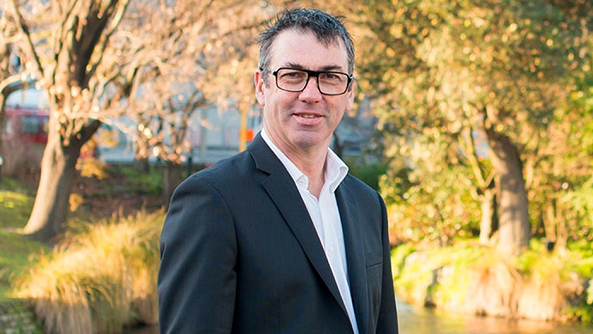
(Dr. Duncan Webb is an advocate for social impact in incorporated entities)
Dr. Webb has served as the MP for Christchurch Central since being elected in 2017. He is the newly appointed Minister of Commerce and Consumer Affairs and Minister for State Owned Enterprises. He replaces Dr. David Clark who has announced his retirement.
“Pay-What-You-Can" Youth Sports Club Provides All With A Fair Shot …
Following several years of careful financial planning, a United States junior football club (DC Eleven (DCXI) based in Washington DC) has implemented a “pay for what you can afford” model in which the costs of families unable to pay the full amount for their child to participate are funded by the club. You can read more about the programme, here.
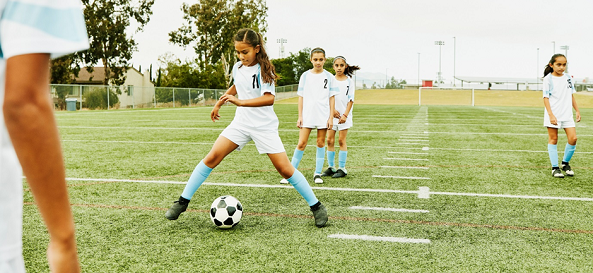
(Economic conditions are correlated to team sport participation)
According to the recent (2022) “State of Play” study from the Aspen Institute, the average family in the United States spends US$883 (NZ$1,300) per child each year on their primary sport. The average costs vary by team sport, with soccer (US$1,188) more expensive on average than baseball (US$714), basketball (US$1,002) and football (US$581).

The study says that “more than half of Americans are considering taking on extra jobs to be able to pay for everyday expenses and meet the rising cost of living as inflation remains high. The last time that happened, team sports participation declined from 45% in 2008 to 37% in 2016. Municipalities and philanthropy invested less money into parks and recreation departments and community leagues during that period.” There is a warning for New Zealand community sport in the US statistics. You read the full report, here.
Replay New Zealand Charitable Trust Extends A Helping Hand …
The "Replay New Zealand Charitable Trust" was registered a year ago, with the objective of collecting and redistributing new and used sports gear to children and families in need, through schools, early childhood centres and community organisations and groups.
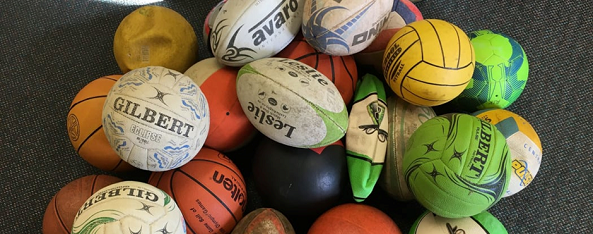
(Replay welcomes donations of used sports gear in a re-useable condition)
Over the past five years, Replay says that they have received and redistributed over 30,000 pieces of sports equipment throughout the Manawatu, Tararua, Whanganui, Rangitikei, Taranaki, Hawkes Bay, and South Auckland regions. It is expanding its activities into other regions.
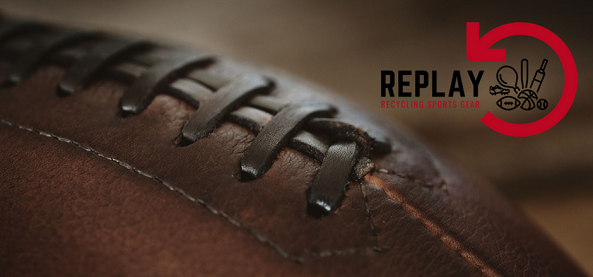
At a time when the cost of participation is preventing some families from providing their children with the sport opportunities they wish to undertake, charities such as Replay New Zealand provide a valuable role in enabling young people to receive the benefits of being part of community sport. You can read more about Replay and its community focus, here.
2022 National Sport Club Survey Workshops To Continue …
In 2023, the National Sport Club Survey will be undertaking its annual interaction with community sport oeganisations for the sixth time, with an anticipated launch (as usual) in August. The project Steering Group is now consulting with key community sport stakeholders on this year’s themes which are “disability sport” and “casualisation”. You can follow the latest developments via Twitter @NSCS_NZ.
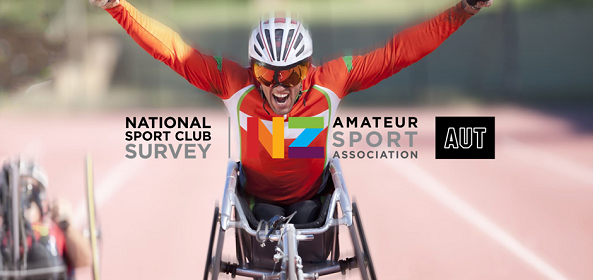
(The sixth annual NSCS will get underway in August 2023)
For those interested in learning more about the 2022 survey insights, enquiries are welcome, with the potential for additional workshops to be arranged in communities where there is specific interest in engaging with the project and its findings.
Viewpoint : New Safety Rules Reflect Community Concerns …
Rugby Union’s new rules regarding tackling have prompted a passionate reaction from supporters of the game, both positive and negative. While New Zealand data concerning Rugby Union participant numbers is not readily available, recent data concerning the numbers of males playing Rugby League in New Zealand reveals a decline of almost 2,000 players, or 23%. Radio New Zealand reports that, “increasing concern and discussion around concussion [is] effecting numbers in many contact sports.”

(A 23% decline in males playing rugby league has been reported)
The latest Sport England data shows the number of adults who play Rugby Union has dropped every year from a peak of 681,700 in 2017, to 294,400 in 2021. The Guardian newspaper reports that, “the “existential threat” to the sport is in how people perceive it, in whether weekend players still believe the risks are worth it, and parents are confident it is safe for their children.”
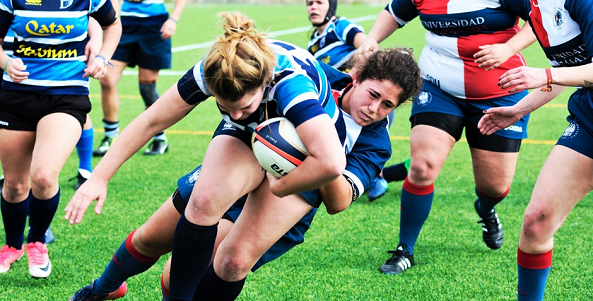
(Female incidence of concussion is said to be higher in sex-comparable sports)
While the rules for the professional game are unchanged, the challenge for the game’s administrators will be how to bridge the gap between the revised safer version of the game for amateur youth and at what age (or developmental stage) it becomes permissible (and socially acceptable) for the new safety laws to no longer apply. You can read more here.
From The Archives …
LYTTELTON TIMES, VOLUME CVIII, ISSUE 12900, 22 AUGUST 1902, PAGE 2
OBITUARY
MR W. MENDELSON
A cable message received on Wednesday evening in Temuka announced the death of Mr Wallingford Mendelson, in Durban, South Africa, whither he went a few months ago. It was in the world of sport that he was perhaps best known, for during the years in which he lived in Canterbury and Otago he took a most active interest in football, cricket and athletics generally. As a footballer he represented Canterbury in 1892 and 1893, at Cambridge he gained his “blue” and in later years did much for the game in South Canterbury.
As a representative cricketer he was well known in the province, and as an athlete he was for some years in the front rank. He was a first-class man over hurdles, and a champion long jumper. He had the honour of representing Cambridge University on more than one occasion, and in 1895 won the Long Jump Championship of this colony, creating a record.”
Wallingford (Wally) Mendelson was born on 29 December 1872, the son of Julius and Carolina Mendelson and the brother of six sisters. His father (who came to New Zealand from Pilica in then “Russian Poland” in 1864, and who was a Justice of the Peace and member of the County Council in Temuka), dropped dead behind the counter of his general store when writing a telegram in December 1882, when Julius nine years old.
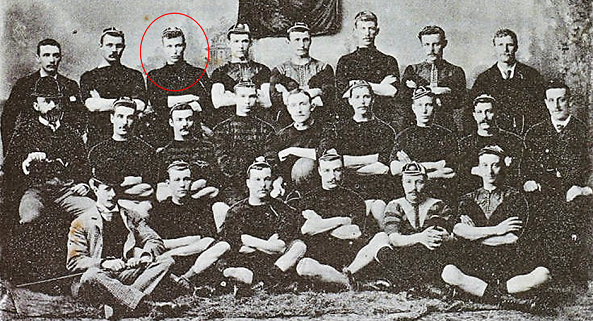
(The 1892 Canterbury Rugby Football Team with Wally Mendelson, circled)
Wally was educated at Christ’s College, Otago University and Cambridge University. In 1892 he graduated with a B.A. at Otago University, and five years later finished his course at Cambridge University in England, by gaining the degree of LL.B. On his return to New Zealand, he began to practise his profession as a solicitor in Timaru, moving later to Temuka.
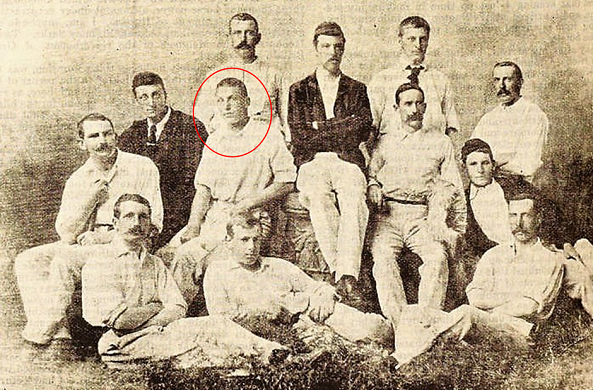
(Temuka's United Cricket Club First Eleven in 1894, with Wally Mendelson circled)
In addition to his sporting prowess on the cricket pitch, rugby field and athletic track, Wally Mendelson was an accomplished fly fisherman. In 1892, he was reported to have landed 230 fish across 17 fishing expeditions, with an aggregate weight of over 215 pounds.
He also lent his support to the promotion of sport and in 1901 was a founding member of the South Canterbury (Rugby) Referees Association, Vice President of the South Canterbury Amateur Athletic Club and Chairman of the Temuka Cricket Club.
In May 1902, he left New Zealand for Johannesbury, South Africa, to “try his fortune”. He died intestate from myelitis in a private hospital on 19 August 1902 in Durban, Natal.
The Final Word …
“All that is really worth the doing, is what we do for others.”
(Lewis Carroll)